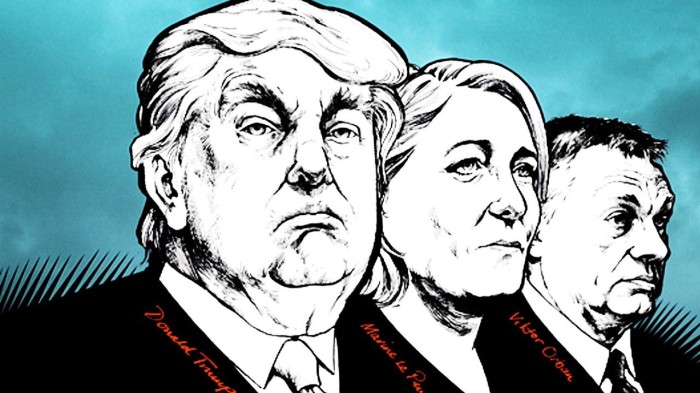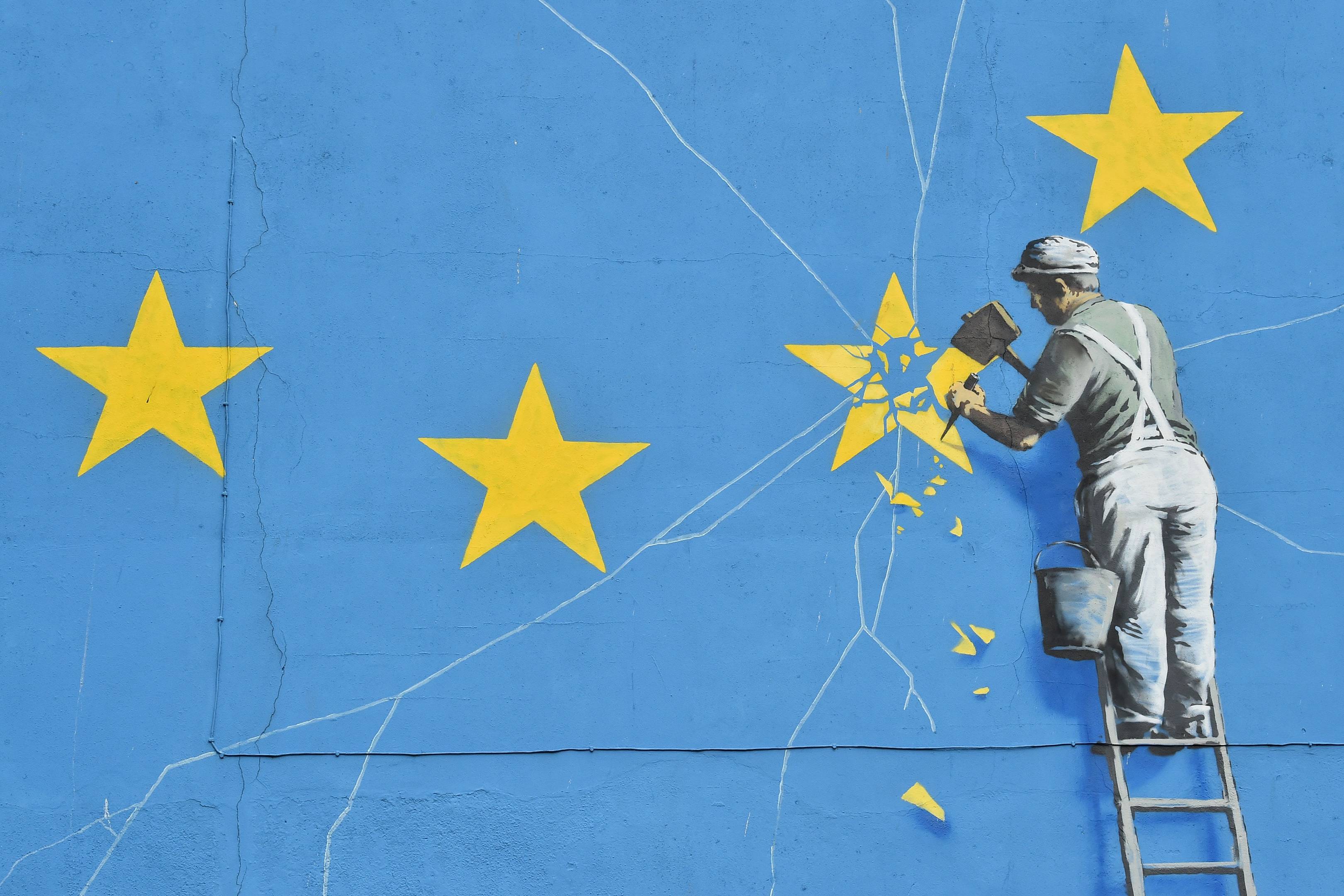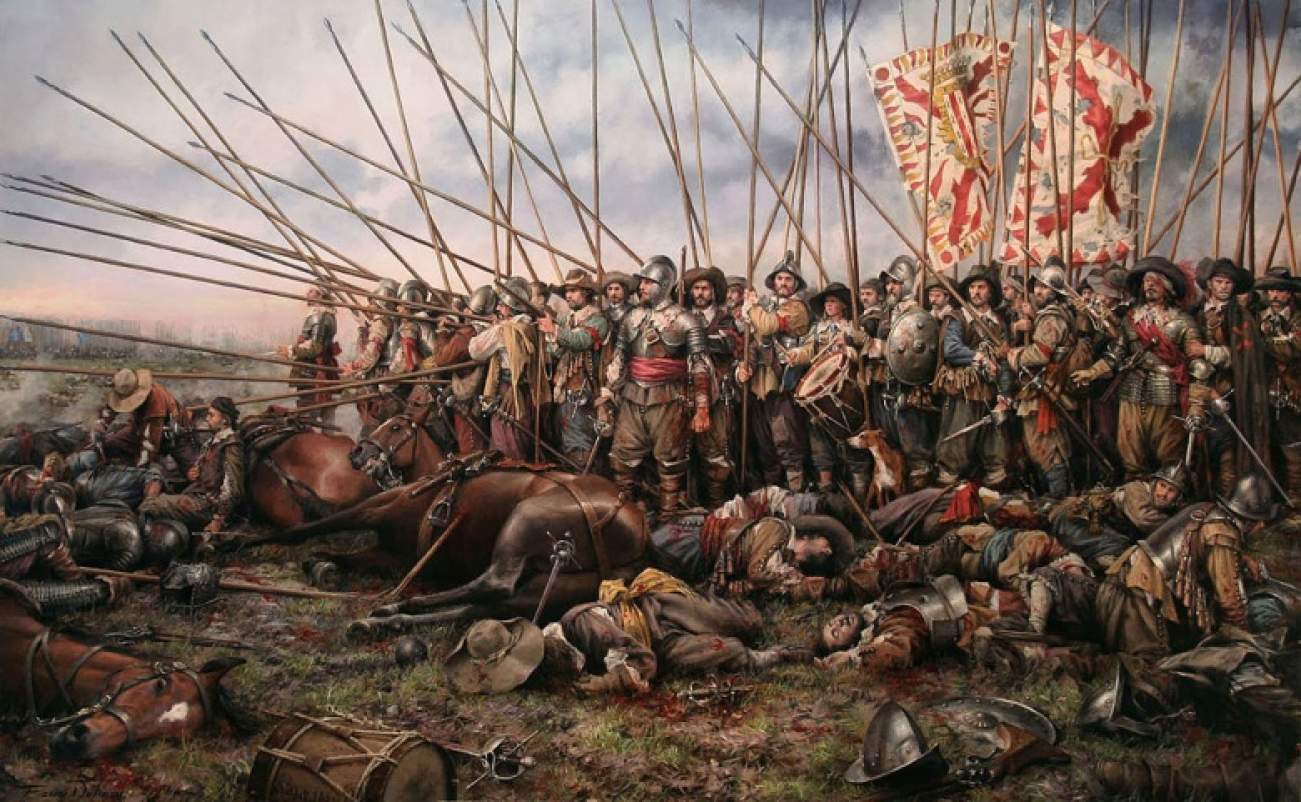Disclaimer: This post is part of a series of essays I wrote at the Young India Fellowship. This particular essay was written as a final paper for the course Globalization on Trial.

This essay attempts to illustrate that the world order tends to oscillate between globalism and populism. Globalism is always preceded and succeeded by populism and vice versa. Additionally, this essay argues that a shift from globalism to populism is almost always influenced by cultural factors rather than economic ones.
Twenty-first-century politics has witnessed an alarming rise of populism in the United States and Europe. The first warning signs came with the UK Brexit Referendum vote in 2016 swinging in the way of Leave. This was followed by a stupendous victory by billionaire Donald Trump to become the 45th President of the United States in November 2016. Since then, Europe has seen a steady rise in populist and far-right parties that have capitalized on Europe’s Immigration Crisis to raise nationalist and anti-Europe sentiments. Some instances include Alternative for Germany (AfD) winning 12.6% of all seats and entering the Bundestag, thus upsetting Germany’s political order for the first time since the Second World War, the success of the Five Star Movement in Italy and the surge in popularity of neo-nazism and neo-fascism in countries such as Hungary, Czech Republic, Poland and Austria.

This rise of the far-right has also, quite obviously, resulted in the decline in popularity of the left and the center-left. The Democratic Party suffered perhaps its largest upset in American Political History when its Presidential Candidate Hillary Clinton was handed a defeat by Trump despite being a clear favorite in the polls. The center-left SpD party of Germany has, for the first time, garnered fewer votes than the right-leaning AfD. The Socialists and the Labour Party in France and the Netherlands respectively also have suffered heavy defeats in parliamentary elections, resulting in significant losses of seats.
With this concise introduction in hand, in the following section, the essay will attempt to illustrate as to why this isn’t a startling phenomenon and instead was extremely predictable given the passage of human political and economic history. As mentioned earlier, the world always oscillates between populism and globalism and one is always preceded and succeeded by the other. To prove this point, this essay will present several instances from world history that clearly illustrate this trend.
As a first example, this essay will consider the Thirty Years War fought in Central Europe between 1618 and 1648. The war, one of the deadliest in human history, recorded over eight million casualties. The political and economic atmosphere of Europe, prior to the seeds of the aforementioned conflict being sown, had many similarities with a globalist ‘state’. A large part of Europe came under the Byzantine Roman Empire and it was relatively alien to the concept of nation states. Since this was an empire, there was a free flow of people and goods. Most importantly, the Protestants and the Catholics, the two major schools of belief in Europe, were free to practice their faith.

Tensions arose when the Holy Roman Emperor, Ferdinand II, tried to impose Roman Catholicism upon all his subjects. The result was a bloody war that lasted over three decades. The Thirty Years War validated the rise of the nation states after the end of the war. It led to the creation of the Dutch Republic, which was finally freed from Spanish rule (barring Southern Netherlands and Luxembourg). It established the dominance of France and the Bourbon Dynasty as well as facilitated the rise of the Swedish Empire.
This illustrates very clearly how a cultural clash (in terms of intolerance of a particular school of belief) triggered the shift of European political order from resembling globalism to nation states.
The following period, starting mid 17th century, saw the rise of East India Companies. The Thirty Years War was immediately followed by the Dutch Golden Age, a period facilitated by the Dutch East India Company, which went on to become the most valuable company of all time. This period also saw the beginning of British conquests into the eastern lands of India, China and Mesopotamia.
Continuing this trend into the 18th century, the European nation states colonized almost the entire known world. Aided by the Industrial Revolution starting in 1760, the world experienced globalization at a pace unparalleled until then. There was free (albeit controversial) flow of goods, people and ideas across continents. Thus, the European nation states built empires with lands spread across the world and brought in another era of globalism. In this way, the circle completed itself.

The next example follows the chronological timeline set by the previous; it starts its examination from the period prior to the outbreak of the First World War. The late nineteenth century was characterized by free trade between European Powers and their colonies (albeit at the expense of the colonies).
However, victories in the 1866 Austro-Prussian War and the 1870 Franco-Prussian war established Germany as a dominant power in Europe. This created tension with the British and French Empires and there was a constant struggle in Europe to ensure a balance of power. The balance broke with the assassination of the Austrian Archduke Franz Ferdinand in June 1914 which plunged Europe, and eventually the entire world, into war.
The defeat of the Triple Entente (comprising of Germany, Austria-Hungary and Italy) to Allied Powers led to the rise of populism and the far-right in these countries. Starting the early 1930s, the Nazi party, under the leadership of Adolf Hitler, turned Germany into a far-right dictatorship. Italy witnessed a similar populist uprising in the form of Benito Mussolini. Hitler’s ideas of Lebensraum and the conviction of the superiority of the Aryan race led him to conquer Poland in 1939, which led to the outbreak of the Second World War.

The Second World War was the deadliest conflict in human history, with over 50 million fatalities. An Allied victory ensured the decimation of the far-right in Europe. The end of the Second World War thus marked the beginning of another shift from nation states and populism into globalism.
The second half of the twentieth century witnessed some amazing developments from the perspective of globalization. The United Nations (UN) was formed in 1945 to maintain international order and ensure that conflicts such as the Second World War didn’t take place again. The European Union was formed in 1957 with the ambitious plan of politically and economically uniting the entire continent of Europe. Economic Liberalization took place in the two largest countries in the world (by population): China, in 1978 and India, in 1991. The World Trade Organization (WTO) was founded in 1995 to regulate international trade.
But perhaps the most aggressive agent of globalization has been the dawn of the Information Age. The invention of the internet and the exponential increase for the demand in IT and software has connected the world like never before. The world has truly become a global village with everyone in the vicinity of communicating with everyone else.
If the aforementioned two examples are anything to go by, it suggests strongly that this wave of globalism will be followed by populism. This is exactly what is being witnessed in the global political landscape today. Therefore, two facts can be concluded beyond a reasonable doubt: globalism and populism operate in a cyclical manner and the preceding decades of globalism have ensured a rise of populism today.
The following sections of this essay will attempt at answering why globalism is succeeded by populist movements (usually by the far-right) by critically analyzing the economic and cultural effects of globalization. The essay will attempt to demonstrate that the latter plays a far larger and significant role than the former.
With the political climate shifting towards the idea of the nation-state (or nationalism), there have been fears of a decline in the popularity of the ideas of globalization, free trade, and open borders. Globalization has come under fire and has been castigated by populist governments worldwide. Some of the most audible dissent to globalization are economic, with the loss of jobs to immigrants, outsourcing and the dying of the manufacturing sector on account of trade and decentralization of production. Donald Trump secured a significant portion of his voter base by appealing to these sentiments. His campaign, with the tagline of Make America Great Again, promised stricter immigration laws, preferential treatment to American production and priority to jobs for Americans. Since becoming president, he has imposed trade tariffs worth hundreds of billions of dollars on countries such as Canada and China in an attempt to correct America’s trade deficit, withdrawn from the Paris Climate Agreement to save the dying coal mining industry and removed the US from the Trans-Pacific Partnership in a bid to further isolate the US from global politics and pump the budget inward.

The economic arguments against globalization are, however, extremely weak and lack statistical backing. The Economist Henry Hazlitt attempts at distilling the entire field of economics to a single principle:
The art of economics consists in looking not merely at the immediate but at the longer effects of any act or policy; it consists in tracing the consequences of that policy not merely for one group but for all groups.
Globalization almost always leads to creative destruction; the phenomena of loss of livelihood to superior technology, innovation or automation. It happened with the Industrial Revolution, it happened with colonization and now, it’s happening with the advent of the Internet.
Phenomena associated with globalization such as automation, free trade, decentralization of production and the internet have led to the loss of livelihood for many people, especially those employed in blue-collar manufacturing jobs.

However, this has also ensured that more output is created with lesser input thus driving down prices and increasing the variety of goods and services available to consumers. In its essence, this is the duty of an economy: to produce as much as possible at the lowest cost. Productivity is the only thing that should count. Lower prices of goods implies consumers have more disposable income in their hands. This stream of extra money, therefore, has the potential to create new industries and jobs for goods and services that people can afford now with the extra money. With Adam Smith’s Invisible Hand argument, it can be shown that the displaced people can actually move to these industries, thus returning the economy back to a stable equilibrium.
Therefore, it can be seen quite clearly that, in the long term, globalization affects all groups positively even in the face of creative destruction.
It is indeed true that globalization displaces some communities in the short run. However, the number of people displaced is dwarfed by the number of people reaping economic gains. It doesn’t make any economic sense at all to discard globalization for its minimal short term side effects. For instance, there are 135,000 works in the US Apparel Industry and 45 million Americans who live below the poverty line. It doesn’t make any economic sense to increase the price of clothing for millions of poor Americans (by banning clothing imports) to ensure a few hundred thousand get to keep their low income, low skill jobs. Following Hazlitt’s principle, it is in the greater interest of a society or country to only produce those goods and services it has a competitive advantage over and imports the rest. Globalization facilitates this and thus ensures stronger economies.
Finally, it is a misconception that the financial crisis created by globalism led to the rise of populism. Many associate the 2008 Economic Crisis as the starting point of Trumpism. However, by the time Americans were voting in 2016, the economy had fully recovered. Also, contrary to what Steve Bannon had claimed, a Gallup poll showed conclusively that non-supporters of Trump were just as likely as the supporters to be unemployed. Shifting our focus to the east, there is almost zero correlation between economic prosperity and the rise of the far-right in Europe too. Norway, Sweden, Denmark, Poland and Finland, all have right-wing populist ruling parties in spite of being some of the most economically prosperous countries in Europe. Therefore, it is imperative that we search for a stronger, alternate reason to explain these shifts.
Apart from economic crises, another school of dissent against globalization comes from cultural homogenization. Since globalization, by its very nature, results in the migration of people from one place to another, it also leads to the transport of cultures. More often than not, tensions arise as a result of the clash of cultures and this leads to the creation of nationalistic sentiments, often at the expense of the immigrants.

Migration is often cited as one of the biggest problems of globalization. However, the economic argument against migration is extremely weak. Take the United States, for instance. Only 33% of Americans hold college degrees and there are simply not enough Americans available to fill in for high skilled jobs. This availability gap is often filled by immigrants. Immigrant communities from India and China are significantly more prosperous, wealthy and educated than the average American.
The phobia against migration stems from xenophobia. Humans are, anthropologically speaking, xenophobic by nature. It is a trait that has allowed mankind to survive and eventually dominate the planet. Humans tend to form communities around ideas or traits and this sense of community is amplified when it comes in conflict with a rival community.

The Syrian Civil War resulted in one of the biggest refugee crisis of all time. This European Refugee Crisis is one of the main reasons for the rise of the far right in Europe. Most of the refugees from the Middle East were Muslims and the integration of Islamic values and traditions at such a humongous scale was the seed of conflict between the immigrants and the largely Christian natives.
Populism, therefore, is fed by xenophobia and racism. It stems from an inherent fear of the European natives for a loss of their culture and identity. Islam is seen as a direct threat to their culture. Harmonic multiculturalism, although a novel concept on paper, is extremely difficult to witness in practicality.
This fear is amplified by a fear of security. Since the starting of the refugee influx into Europe, there have been several, large scale terrorist attacks in major European cities with refugee perpetrators. France witnessed attacks in Nice and Paris in 2015 and 2016 that resulted in hundreds of death. Great Britain, too, has had its share of violence in the form of the Manchester Bombing in 2017 and semi-regular instances of refugee violence in London.
These attacks have led people to associate all refugees as terrorists, rapists, and haters of Europe; although an extremely negligible fraction of them are involved with extremism. Similar rhetoric was used to great success by Donald Trump through his stance on immigration and the wall on the US-Mexican border.
As we have already seen, cultural factors usually are the trigger for the genesis of populist movements. The Thirty Years War started when Catholicism was forced on the people. World War 2 occurred largely in part of Hitler’s goal to establish Aryan dominance and decimate any race that he thought inferior.
Therefore, it can be stated that globalism leads to multiculturalism which in turn leads to a clash of cultures and idea. These clashes form the breeding ground for chauvinism and populist movements and play a far greater role in the shift than economic concerns.
In conclusion, this paper has illustrated through historical examples, how globalism leads to populism and vice versa. They are states through which global political order regularly oscillates between. Finally, the paper demonstrated how cultural and not economic factors played a larger role in aiding shifts from globalism to populism.
References
- Galston, William. 2018. The rise of European Populism and collapse of the Centre-Left. Brookings.
- Marr, Andrew. 2013. A History of the World. Pan Publishing
- Polišenský, P.V. 1954. The Thirty Years War. 31-43 in Past & Present. Oxford University Press.
- King, Stephen. 2017. The pendulum swings between Globalisation and the Nation State. Financial Times.
- Kothari, Rajni. 1995. Under Globalisation: Will Nation State hold? 1593-1603 in Economic & Political Weekly Vol. 30 No. 26. Economic & Political Weekly
- Shuster, Simon. 2018. The Populists. TIME Magazine.
- Suter, Keith. 2018. The Future of the Nation-state in an Era of Globalization. 32-38 in Cadmus Journal Volume 3 Issue 4. Cadmus.
- Roth, Kenneth. 2017. The Dangerous Rise of Populism: Global Attacks on Human Rights Values in World Report 2017. Human Rights Watch.
- Cox, Michael. 2018. Understanding the Global Rise of Populism in Strategic Update, Feb 2018. LSE Ideas.
- Hazlitt, Henry. 1946. Economics in One Lesson. Harper & Row Publishing.
- Cramer, Kevin. 2007. The Thirty Years’ War and German Memory in the Nineteenth Century. 18-19 in Studies in War, Society, and the Military. University of Nebraska Press.
- Greg, IP. 2018. No, the Financial Crisis didn’t Spawn Populism. The Washington Journal.
- Argandona, Antonio. 2017. Why Populism is Rising and How to Combat it. Forbes.
- Malets, Olga. 2017. Globalization, governance and the nation-state: An Overview. 16-24 in Economic Sociology Vol. 18 Iss. 2. Max Planck Institute for the Study of Societies (MPIfG), Cologne.
- Mitchell, Deborah. 2000. Globalization and social cohesion: Risks and responsibilities. The Year 2000 International Research Conference on Social Security.
- Tierney, Stephen. 2015. Which Pluralism? 186-203 in Nationalism and Globalisation. Bloomsbury Publishing.
- Kauffman, Eric. 2004. Rethinking Ethnicity: Majority Groups and Dominant Minorities. 40-57. Psychology Press.
- Lund, Susan and Tyson, Laura. 2018. Globalization is Not in Retreat. Council on Foreign Relations.
- Sides, John; Tesler, Michael, and Vavreck, Lynn. 2018. Identity Crisis: The 2016 Election & the Battle for the Meaning of America. Princeton University Press.
- Eckman, James. 2017. Globalism vs. Nationalism: The Ideological Struggle of the 21st Century. Wall Street Journal.
- Haidt, Jonathan. 2016. When and Why Nationalism Beats Globalism. 46-53 in The American Interest Vol. 32 No. 3. The American Interest.
- Cuperus, Rene. 2007. Populism against Globalisation: A New European Revolt. Kalevi Sorsa Foundation.
- Spannaus, Andrew. 2018. Regime Change and Globalization Fuel Europe’s Refugee and Migrant Crisis. Consortium News.






























































